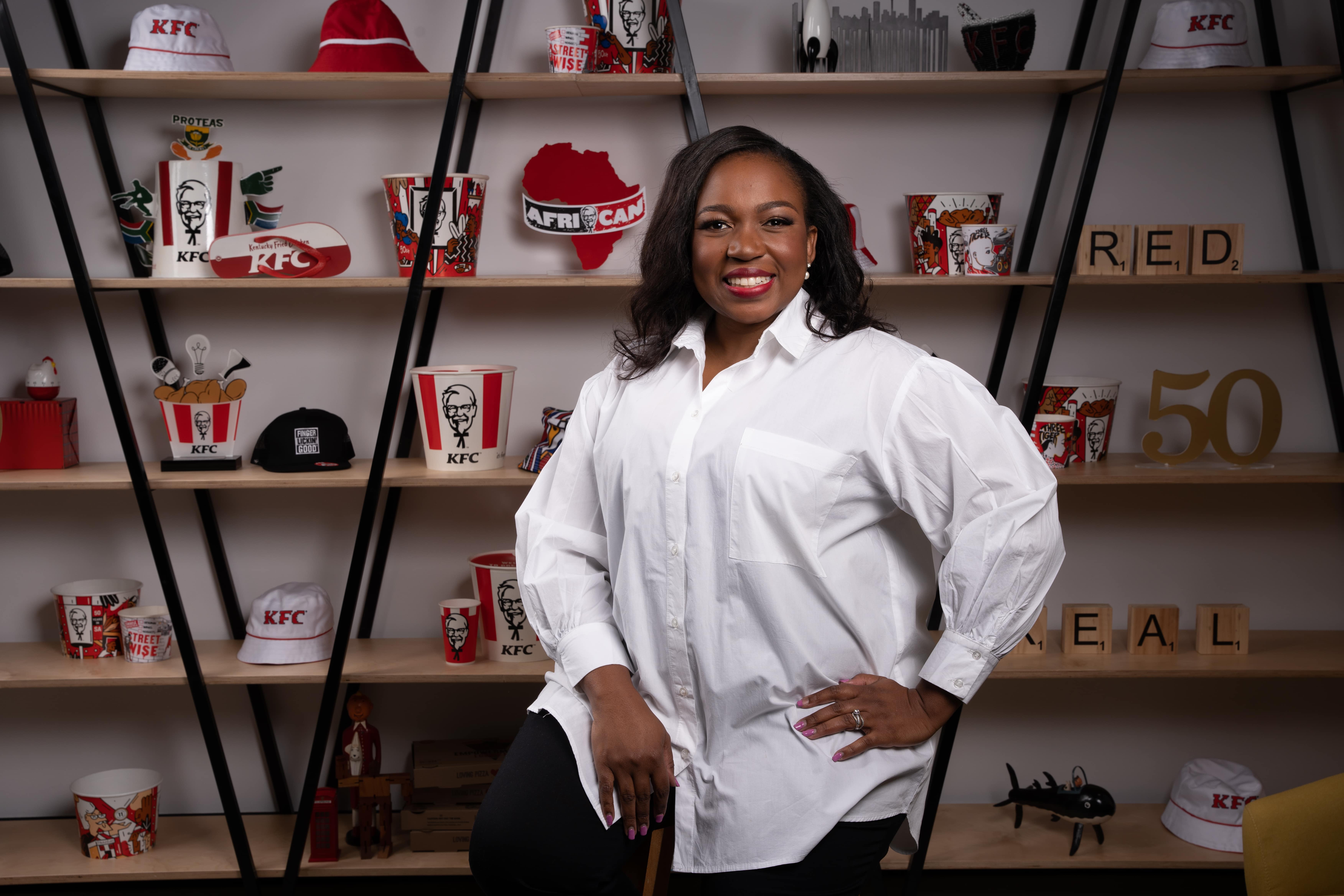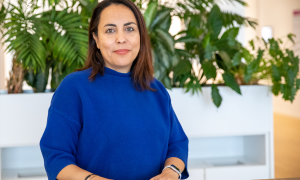For over half a century, KFC Africa has been a staple in South Africa and now spans over 1,400 restaurants across 23 sub-Saharan Africa markets.
Now under the leadership of Akhona Qengqe, the first Black African female General Manager, the brand is undergoing a transformative journey. Qengqe champions inclusivity and digitization, propelling initiatives that amplify the brand’s appeal across Africa while advancing gender equality and engaging the youth. Her success is redefining industry standards for growth and inclusivity in the quick-service restaurant sector.
Diversity in experience
Qengqe’s journey to becoming KFC Africa’s General Manager has touched almost every area of the quick service restaurant (QSR) industry. Her career spanned Procter & Gamble, Shell, and Yum! Restaurants, where she worked across marketing, area management, property, strategy and retail.
“This broad foundation gave me insights into how businesses actually run,” she reflects, “[coming into KFC] I had a lot of context of the market in South Africa and across the continent about retail, real estate and what appeals to consumers.”
While in her early years at KFC, Qengqe played a role in advancing the brand’s expansion ambition of painting Africa red, one that has led to the brand’s presence in 23 markets across Sub-Saharan Africa; more significantly, she has held an ambition of becoming the world’s most inclusive QSR brand. Community and gender inclusion remain her biggest imperatives.
“My belief has always been that we need to be a KFC Africa that draws on African talent,” she asserts, highlighting her success in increasing African representation in management and leadership roles to 60 percent.
Qengqe’s leadership has been transformative, particularly through the creation of ‘Women on the Move’, a programme designed to elevate women into significant leadership roles, mirroring Qengqe’s own inspiring journey. “Growing up, I witnessed firsthand the struggles faced by marginalised women, an experience that fuelled my ambition to break barriers within the corporate world,” she shares.
In addition to this, Qengqe also leads ‘Shine’, a gender inclusion initiative embedded across all KFC business units globally, as well as the Ikusasa Lethu scholarship programme in partnership with Curro independent schools. This scholarship programme is dedicated to uplifting the most deserving children of KFC’s team members, providing them with access to quality education which will in turn offer them more opportunities for advancement in the future.
My belief has always been that we need to be a KFC Africa that draws on African talent.
Both programmes now form a fundamental aspect of the company’s culture, enhancing employee satisfaction and building meaningful connections between KFC and the communities it operates in. Beyond that, Qengqe is ultimately building a lasting legacy of hope and opportunity.
While KFC is recognised for its chicken, Qengqe stresses that the brand’s role extends far beyond that. “We are second only to the government in how many children we feed in South Africa through our signature programme, Add Hope. How we double down on that to help our communities will always be a challenge I pose to myself.”
Feeding growth in the digital age
It’s not just social growth but business too. KFC Africa continues to outperform the rest of the market in growth and revenue.
So how do they do it? “Our ability to partner with franchisee operators,” Qengqe explains. In their franchise operations, KFC ensures that decisions about store investments and locations are driven by data. “We don’t just consider the number of franchisees; we also evaluate whether each location is the optimal asset for that franchisee’s portfolio,” she adds. This model has allowed KFC to scale efficiently, maintaining a quality and consistency that customers trust.
The landscape of quick-service restaurants is as much about understanding market trends as it is about foreseeing them.
In 1971, KFC opened its first store, cultivating a strong heritage that resonates well with many but less so with younger demographics. Recognising the shift towards a more digital-savvy consumer base, particularly among the youth, the KFC team launched a fully digital concept store in Johannesburg’s student district, featuring music, Virtual Reality gaming experiences, and kiosk ordering in local languages. This store, along with a second location in Morningside in Johannesburg, targeting higher-end consumers with offerings like breakfast and coffee, represents KFC’s shift towards innovation and catering to the evolving tastes of younger customers. “I am super proud of these efforts by our team and their courage in trying something different,” Qengqe remarks.
“The push towards digitisation is crucial as we aim to build outlets that not only meet today’s consumer needs but are poised to outperform in the future,” Qengqe explains. This strategic foresight is evident in how these digital initiatives align with global consumer trends, ensuring that KFC remains a leader in the quick-service sector.
Local needs and global flavours
However, it’s not all visions from the top. Qengqe understands that the journey to making great chicken and running efficient restaurants goes beyond internal operations.
“Our ability to partner with suppliers has been key,” Qengqe explains. “We support our suppliers’ growth, we invest in their development, and they scale up with and because of us,” she adds. This investment in suppliers ensures that KFC can maintain high standards across its locations while fostering a network that is robust and responsive to market changes such as scheduled blackouts and regional unrest.
Moreover, suppliers play a pivotal role in KFC’s menu development and innovation. “Our suppliers are our biggest enablers. While we generate the ideas from an innovation standpoint, it is our partners and suppliers who bring these concepts to life by ensuring we can access the right ingredients at the expected quality levels,” Qengqe notes.
"We support our suppliers’ growth, we invest in their development, and they scale up with and because of us."
But while innovations from around the globe are sometimes brought to African shores, KFC also understands the importance of innovating with suppliers specifically for the continent. This collaborative process is essential for adapting the menu to suit local tastes and preferences, ensuring that what KFC offers is not just appealing but also relevant to its diverse customer base across Africa.
Similarly, KFC under Qengqe has continued to meet other local challenges — like meal pricing relative to local living costs. KFC has managed to remain accessible by introducing cost-effective options such as Streetwise 2 for ZAR39.90 (€2.06), catering to over half the population who live on less than ZAR41 (€2.26) a day. An embodiment of KFC’s dedication to local relevance and value, driven by innovation and menu development.
Through an unwavering commitment to local needs, Akhona Qengqe is steering KFC Africa towards a future marked by growth and innovation, while also creating an environment where diversity is celebrated and opportunities are accessible for all. Her vision for a modern, inclusive KFC Africa is setting new benchmarks for what it means to be a leader in the global quick-service restaurant industry, and she promises that the next five years will bring even more of that.
Click here to read and download the full article.







